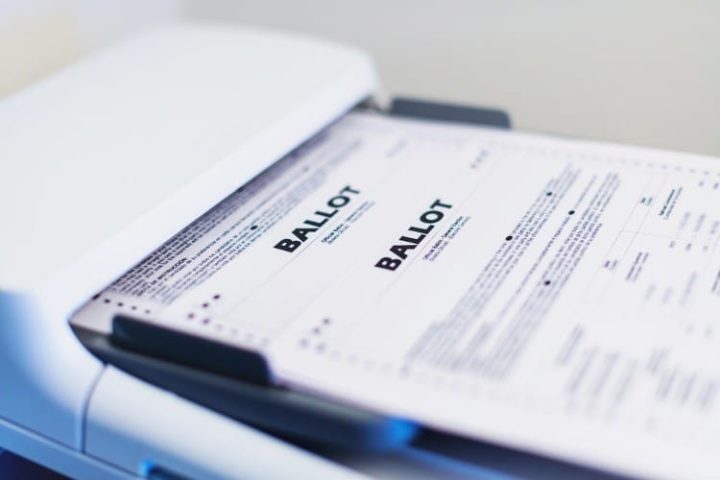
Seven states have withdrawn their memberships in ERIC, the Electronic Registration Information Center. The name sounds innocuous enough. But its seed money came from the Pew Charitable Trusts, a favorite of George Soros, and conservative commentators call it one of the most nefarious election-fraud establishments in the country.
ERIC is a nonprofit membership organization that is supposed to help states clean up their voter registration lists. It identifies people who have moved, died, or are otherwise ineligible to vote.
But a new Judicial Watch white paper reveals what actually happens when a state joins ERIC.
Members must turn over all data on every voter, past and present, along with information from other agencies: green card and state ID holders, including driver’s licenses. Federal records are used as well, both from the Social Security death index and the U.S. Postal Service.
Analyzing all this data, ERIC discovers those who are disqualified. But instead of purging them from voter lists, the organization requires member states to solicit voter registrations from those ineligible voters. Kat Stansell, Grassroots Coordinator with the American Policy Center, told The New American what the results of these data gymnastics were in 2020:
ERIC managed to come up with 17 million new voters by 2020. Eight years, 17 million new voters. And I looked at the population trends and the voting trends during that period of time, and they’re the opposite direction…. Half of those [ERIC member] states have voter rolls in excess of 100 percent of all possible eligible voting-age citizens.
She then listed several: Alabama, 100.9 percent; Alaska, 121.7 percent; Colorado, 103.6 percent; Delaware, 104.1 percent; Florida, 101.6 percent; Georgia, 103.6 percent; Nevada, 101 percent; Rhode Island, 102 percent; South Carolina, 101.8 percent; Illinois 108.2, percent; Kentucky, 106.5 percent; Maine 106.9, percent; Maryland 100.4, percent; Michigan 108.1, percent; and Washington state, 100 percent.
Judicial Watch concluded that ERIC has been “far more effective at swelling voter registration rolls than at keeping them clean.” Stansell warned that even red states are not immune. She highlighted problems in Florida, which were jaw-dropping and likely influenced the state’s decision to withdraw its membership.
The secretaries of election just in Lake County, where several of them live and have been doing the canvassing — you know, wearing out their shoe leather — found that in the director of elections office there were 18,000 pieces of mail returned with that yellow undeliverable mail sticker on it. They were in trays, on shelves, in the Supervisor of Elections office. Instead of those being flagged and taken off, because they’re obviously not there, somehow those same addresses received ballots and voted. Those same addresses are voted in the state of Florida.
At its height, ERIC boasted 34 members, including the District of Columbia. Today, there are only 27, and Judicial Watch attributes the decline to a Republican exodus. Alabama, Florida, Iowa, Louisiana, Missouri, Ohio, and West Virginia have dropped out or are in the process of withdrawing.
Some of these states claim that ERIC membership potentially violates several federal statutes. The Help America Vote Act makes no provision for states to outsource their responsibility in regard to maintaining accurate voter files. The National Voter Registration Act establishes privacy protections for individuals who have declined to register. The Driver’s Privacy Protection Act similarly safeguards license holders.
In last year’s Arizona GOP primary debate, secretary of state candidate Mark Finchem vowed to immediately end participation in ERIC, should he win the election.
Debate moderator: “Representative Finchem, tell me this. What is the first thing you plan to accomplish when you become the Secretary of State.”
Finchem: “Get us out of ERIC!”
Finchem went on to describe the program and then explain his objections. “ERIC, once a state joins, keeps your information. They shut down — because you have to sign a contract — they shut down your access to our voter information. That is unacceptable.”
Unfortunately, Democrat Adrian Fontes defeated Finchem.
Alabama was more fortunate in the midterms. Leading up to that election, Republican Secretary of State John Merrill told Dan Abrams that he was a big fan of ERIC. “We have absolutely no plans to remove ourselves from ERIC membership,” Merrill assured him. “We will continue to use it to help fortify our voter rolls, to ensure that we’re continuing to make it easy to vote and hard to cheat in Alabama.”
But Republican Wes Allen defeated Merrill in the midterm election, and one of his first acts was to end his state’s ERIC membership. He issued a press release announcing, “I have informed them, via certified letter, that upon my inauguration on January 16, 2023, Alabama will immediately and permanently cease to transmit any information regarding any citizen in the State of Alabama to their organization.”
However, because of ERIC bylaws, Alabama’s resignation was not effective until today.
David Becker founded ERIC through the Pew Charitable Trusts in 2012. He had been fired from the U.S. Department of Justice in 2005, where he worked in the Civil Rights division. His boss at the time, Brad Scholzman, called him “a hard core leftist” who “couldn’t stand conservatives” and who had engaged in the “most unethical” behavior Scholzman had “ever seen.”
In 2016, Becker also established a legal fund to defend poll workers and county officials charged with election fraud. That fund is called the Center for Election Innovation and Research (CEIR), and it was one of the infamous recipients of Zuckerbucks during the 2020 election.
Wisconsin’s special counsel in that state’s election probe, Michael Gableman, reported: “CEIR, Center for Election Innovation and Research, David Becker, who came here with his Election Official Legal Defense fund, telling everyone that Meagan Wolfe and WEC [Wisconsin Elections Commission and its administrator] ran the best election in the history of the country, and is a shining model for the world. All these people who ran such a shining model of the world are sure shy when it comes to talking with the office of special counsel about what they did and why they did it.” He opined that their Zuckerberg funding source explained their hesitancy at coming forward.




